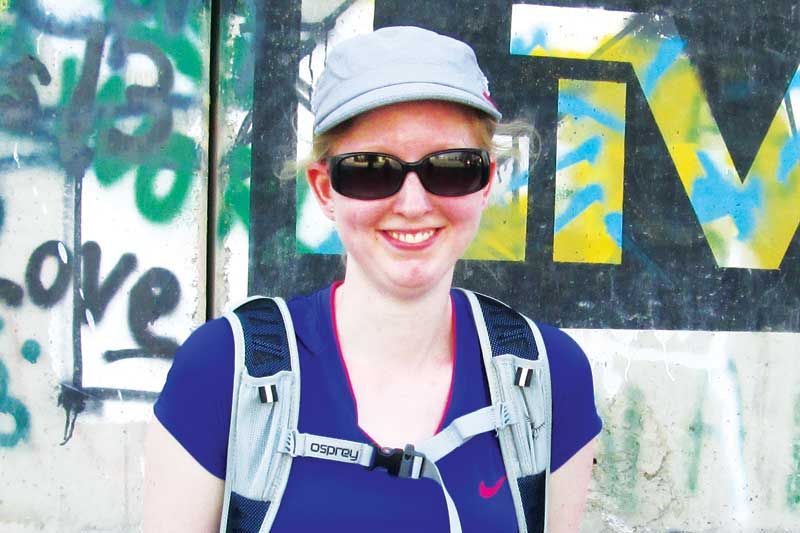Julie Druker | Sep 18, 2013
Sometimes it is only through the fresh eyes, open hearts and keen minds of younger folk that any kind of sense at all can be made of decades-old global conflicts that have consumed thousands of lives, negatively affected ordinary people over many generations, and which have yet to come to any kind of lasting resolution or peace.
NAEC graduate Jory Bolton, who just completed her undergraduate studies in international development and Spanish at Trent University, recently returned from a trip to the Middle East, where she was a backpacktavist and participant in Operation Groundswell.
Operation Groundswell is a not-for-profit volunteer travel organization whose goal is to immerse like-minded young students in areas of global conflict while introducing to them members of all the parties involved. The hope is that their new ideas will “swell out” into the world and make positive change in these war-torn regions.
Bolton, who wisely kept a journal during her six-week trip there this summer, said that instead of trying to understand the conflict solely in political terms, she instead came at it from the human side. Her observations, experiences and understanding made for an exceptional account of life both in Israel and Palestine.
It was through formal meetings with politicians that included members of the Knesset, Hamas, and Fatah, meetings with activists, soldiers, freedom fighters, military people, Bedouin chiefs and villagers, lawyers, and with those living and working in refugee camps as well as many conversations with everyday people on the street both in Israel and Palestine that she came away with what proved to be a mature, wise and broad understanding of a part of the world that tends to baffle most people.
Bolton said that the main goal of her group was to “stand in solidarity with those oppressed regardless of race, gender and age ... I really tried to not pick sides, not to be pro-Palestinian or pro-Israeli no matter what situation I was in. It's really important to try to sit back and listen to what both sides have to say; to support both sides even if you don't support some of their specific policies. You have to think that these people are just like me except that they have to live every day with these policies.”
She recalled how she and her group tried to behave always with the quote in mind: “Never doubt that it is small groups of thoughtful, committed citizens that change the world. It is the only thing that ever has.” Bolton added, “ It's not the big corporations or the presidents or the big political parties that make the change. For me it was the people I met in the Palestinian refugee camps delivering grass roots activism who were making the change, as well as the Israeli soldier who said he didn't want to fight but chose to in order to make sure that Palestinians' human rights were not being abused.”
Many of Bolton's insights seemed wise beyond her 22 years. “A lot of the misconceptions we have come from what we see on TV - like the radical Muslim man with the rocket launcher on his back - because that is what sells. I never once saw that - ever.”
She said that being there, she came to understand how, “There is this constant battle between the influences of the radicals on both sides who are a tiny minority compared to the much larger majority of people on both sides who are moderate and who want to stay that way.” She continued, “People often ask me about the fanaticism there. Yes, there are fanatics but what people don't realize is that they are the very small minority who are getting pushed out by the everyday activists and people just living their lives and who want nothing to do with fanaticism.”
Bolton also spoke of the volunteer work that she and her team did there. One stint was spent at Al Noor, a school for special needs children of Palestinian descent located in Jerusalem and funded wholly by the Israeli government. There Bolton spoke to one woman who has continued to work at the same job even though the separation wall that was built in 2006 turned the woman's 30-second walk to work into a three-hour commute each way. Asked by Bolton why she chose to keep her job, the woman told Bolton, “To exist is to resist.”
Bolton said she heard this phrase often during her trip and said it explained how everyday people are resisting government policies by continuing to live their lives. Bolton's in-depth presentation demonstrated that young people exposed first hand to the highly conflicted regions of the world and determined to make a positive impact on them often come away from the experience understanding that the majority of those affected by the conflict, on both sides, are ordinary people hoping and striving to live their lives in peace. It's inspiring to know that one motivated student whose mind and heart are in the right place is hoping to make changes in places where positive changes are both needed and wanted.
Bolton will travel to Spain this coming week, where she will teach for a year and then resume her academic studies in this country, with a focus on refugee studies.
More Stories
- The Sun Shines On The Parham Fair
- Creating Your Own Weather, Forever and Ever
- Silver Lake Pow Wow Set For A Big Year
- South Frontenac Receives Substantial Provincial Grant for their Verona Housing Project
- South Frontenac Council Report - August 12
- Dumping To Be Curtailed At Loughborough Waste Site
- Central Frontenac Inching Towards Increasing Severance Opportunities
- Addington Highlands Council Report - August 12
- Addington Highlands Council Report - August 5
- Addington Highlands Council Report - August 12

